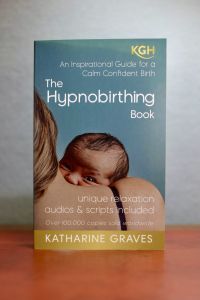Two of the main criticisms I have heard levelled against hypnobirthing are that a woman feels she has failed if she hasn’t achieved the perfect birth (whatever that may be), and that women are told they are not allowed to push which is unrealistic.
The first thing about this is that the word hypnobirthing is used generically without reference to which school of hypnobirthing is being discussed. It’s rather like saying, ‘All cars handle badly,’ rather than specifying a particular make which may have the problem.
First let’s look at the question about whether a hypnobirthing mother feels guilty if she hasn’t given her baby the perfect birth, whatever that may be. In KG Hypnobirthing we take enormous care, right from the start to ensure this does not happen, and I believe there are other schools of hypnobirthing that take the same view. At the beginning of our course, when couples are asked to tell us what it is about birth that they fear, they almost always include procedures like induction of labour, drugs, c-section, forceps, ventouse, episiotomy, etc. We then point out that all these things are wonderful and life-savers in the right circumstances and that the only problem arises when they are over–used or become routine. We stress that we are extremely lucky to live in a society where this help is available when needed, and this theme continues throughout the course.
To push or not to push
Now comes the question of whether to push or not to push. Some people have strong feelings on this which is unfortunate and unnecessary. In KG Hypnobirthing we teach women the breathing to use in this stage of labour which experience shows works very well on its own. Some women feel the urge to bear down as well and, with hypnobirthing she has learnt to relax and listen to and work with her body, so it would be ridiculous and indeed harmful to try to stop this urge if it arises. In fact she couldn’t stop it if she tried. All that would happen is that she would tense up and possibly tear. There are still some health professionals who urge a woman to push, and this is equally harmful, as it also means she forces her muscles and possibly tears. The answer is that you do the breathing and bear down if you feel the urge but the breathing will work well on its own if you don’t. There is no dogma; just plain common sense.
Some people suffer under the misconception that hypnobirthing is only for ‘low risk’ women. This obsession on ‘risk’ is harmful in itself, but hypnobirthing makes a difference to all women. I realise that this is a sweeping statement and I would very seldom use the word ‘all’, but my experience is that this is the case. Of course we cannot promise ‘the perfect birth’. Nothing could, and it would be untrue to suggest this. You could look at a woman’s experience of birth as coming somewhere along a line, a continuum. At one end is the screaming and writhing in agony that is often portrayed on the media. On the other end you get the situation that it not infrequently reported to me from KG Hypnobirthing mothers that there was no pain and giving birth was the most wonderful and empowering experience of her life. Everyone naturally comes somewhere along this line, and hypnobirthing always moves a woman along the line towards the birth she would hope to have. One of the things that makes an enormous difference to how far she moves is the practice she does at home which is simple and very effective and is taught to her and her partner on the course.
A midwife who attended the KG Hypnobirthing Teacher Training Course reported to me that the most impressive example of hypnobirthing she ever saw was a woman who had a long induced labour ending in a caesarean. Throughout the labour she was sitting on a birth ball and the only indication that she was having a contraction was that her fingers moved slightly. Not the birth she would have hoped for, but nevertheless hypnobirthing made a massive difference to her and her baby’s experience.
Calm in an emergency
Hypnobirthing mothers have also reported that, when an emergency arose, everyone else around them seemed to be panicking, but they felt completely calm. The benefits of this are that she would continue to produce oxytocin, the hormone of calm, which would continue to facilitate the working of the muscles of the uterus and the production of the hormones of birth, and would affect both her and her baby’s experience of birth.
Of course the person who is with a woman in labour is of vital importance to her experience. There are a few pockets of excellence where the NHS provides continuity of care from a known midwife, but sadly this is seldom the case. Some woman turn to an independent midwife for the care they would like to receive, and some employ a doula to support them on their journey. It is also one of the huge advantages of a hypnobirthing father who is well trained and understands what she is doing and how to help her. He also has the advantage of being the person she knows and loves.
Birth is always a powerful experience as some of the strongest muscles of the human body are working to capacity, but it does not have to be a painful experience. Powerful and painful are entirely different experiences.









